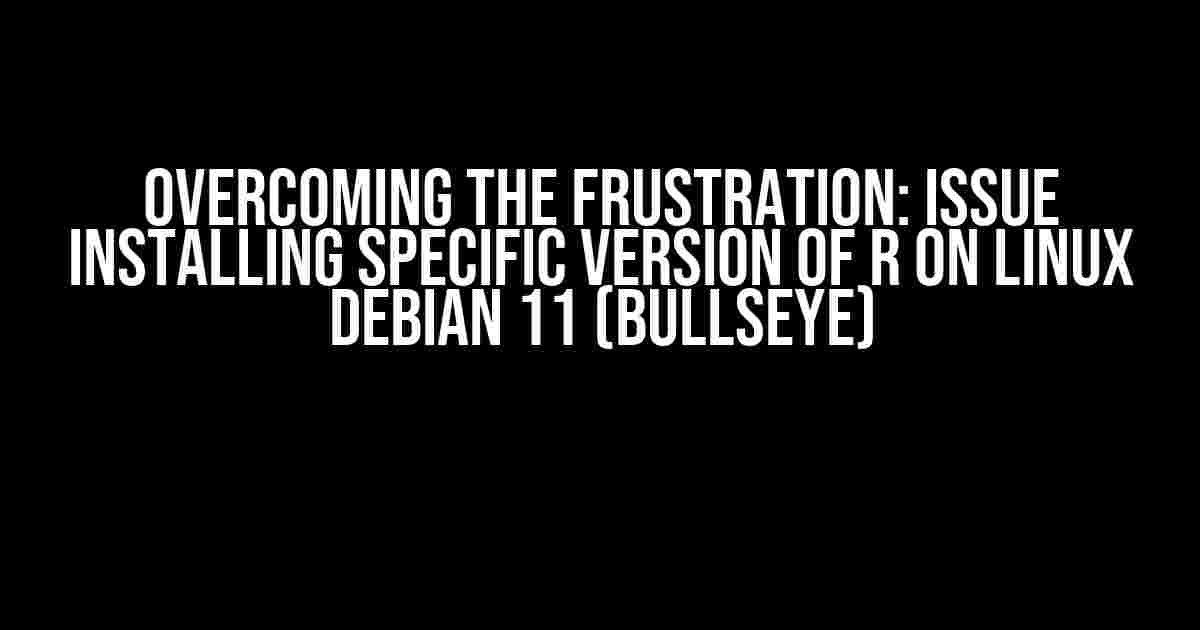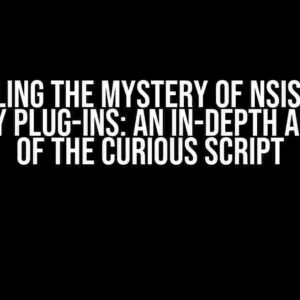Are you fed up with trying to install a specific version of R on your Linux Debian 11 (Bullseye) system, only to be met with errors and frustration? You’re not alone! Many users have struggled with this very issue, but fear not, dear reader, for we’re about to dive into the solution that will get you up and running in no time.
Understanding the Problem
Before we dive into the solution, let’s take a step back and understand why this issue arises in the first place. Debian 11 (Bullseye) comes with a default version of R, which might not be the version you need for your specific projects or requirements. Perhaps you need to install an older version of R due to compatibility issues or require a newer version for its enhanced features.
Why the Default Version Won’t Cut It
The default version of R on Debian 11 is typically the latest stable version available at the time of the release. While this is great for most users, it can cause issues for those who require a specific version. Here are some reasons why the default version might not be suitable:
- Compatibility issues**: Older projects or packages might not be compatible with the latest version of R, forcing you to downgrade to a compatible version.
- New feature requirements**: You might need a newer version of R to take advantage of its enhanced features, such as improved performance or additional functionality.
- Specific package dependencies**: Certain R packages require specific versions of R to function correctly, making it essential to install the correct version.
Adding the CRAN Repository
To install a specific version of R, we’ll need to add the CRAN (Comprehensive R Archive Network) repository to our system. This will allow us to access a wide range of R versions and packages. Here’s how to do it:
Open a terminal and enter the following command:
sudo add-apt-repository 'deb https://cloud.r-project.org/bin/linux/debian bullseye-cran40/'Update the package list:
sudo apt updateInstalling a Specific Version of R
Now that we have the CRAN repository added, we can install a specific version of R. Let’s say we want to install R version 3.6.3. Here’s how to do it:
First, remove any existing R installation (if you’ve tried installing it before):
sudo apt purge r-base-coreThen, install the desired version of R:
sudo apt install r-base-core=3.6.3-1bullseye0Make sure to replace `3.6.3-1bullseye0` with the version you need. You can find a list of available versions using the following command:
apt policy r-base-coreVerifying the Installation
Once the installation is complete, let’s verify that we have the correct version of R installed:
R --versionThis should display the version of R you installed, in our case, 3.6.3.
Troubleshooting Common Issues
During the installation process, you might encounter some common issues. Here are some solutions to get you back on track:
Error: Unable to Correctly Determine the Platform
If you encounter an error message stating that R is unable to correctly determine the platform, try running the following command:
sudo apt install libssl1.0-devThis will install the required dependencies, and you should be able to proceed with the installation.
Error: Dependency Issues
If you encounter dependency issues during the installation, try running the following command:
sudo apt-get install -fThis will attempt to fix any broken dependencies and allow the installation to continue.
Conclusion
Installing a specific version of R on Linux Debian 11 (Bullseye) might seem daunting at first, but with the right guidance, it’s a breeze. By adding the CRAN repository and specifying the desired version, you can overcome the frustration of dealing with the default version. Remember to verify your installation and troubleshoot any common issues that might arise. Happy R-ing!
| Version | Command |
|---|---|
| R 3.6.3 | sudo apt install r-base-core=3.6.3-1bullseye0 |
| R 3.7.0 | sudo apt install r-base-core=3.7.0-1bullseye0 |
| R 4.0.0 | sudo apt install r-base-core=4.0.0-1bullseye0 |
Some common R versions and their corresponding installation commands are shown above. Replace the version number with the one you need, and you’re good to go!
Frequently Asked Question
Having trouble installing a specific version of R on Linux Debian 11 (bullseye)? We’ve got you covered! Check out these frequently asked questions and answers to get back on track.
Q: Why can’t I install a specific version of R on Debian 11 (bullseye)?
A: You might be trying to install a version that’s not compatible with bullseye. Debian 11 (bullseye) is based on Ubuntu 20.04, which has a different package repository than previous versions. Try checking the official R website for compatible versions or use the `sudo apt-get install r-base` command to install the latest available version.
Q: How do I install an older version of R on Debian 11 (bullseye)?
A: You can install an older version of R by adding the relevant repository to your sources.list file. For example, to install R 3.6, add the following line: `deb https://cloud.r-project.org/bin/linux/debian buster-cran35/` and then run `sudo apt-get update` followed by `sudo apt-get install r-base=3.6*`. Make sure to replace “buster-cran35” with the correct repository for the version you want to install.
Q: I’m getting a “package not found” error when trying to install R on Debian 11 (bullseye). What’s going on?
A: This error usually occurs when the package repository is not configured correctly. Try updating your package list by running `sudo apt-get update` and then try installing R again using `sudo apt-get install r-base`. If the error persists, check your internet connection and try again.
Q: Can I install R from source on Debian 11 (bullseye)?
A: Yes, you can install R from source on Debian 11 (bullseye). However, this method requires more technical expertise and can be time-consuming. You’ll need to download the source code from the official R website, configure, and compile it manually. Make sure to install all the required dependencies before compiling.
Q: How do I verify that the correct version of R is installed on Debian 11 (bullseye)?
A: Once you’ve installed R, you can verify the version by opening a terminal and typing `R –version`. This command will display the version of R installed on your system. Alternatively, you can check the version by running `apt-cache policy r-base` to see the installed and available versions of R.


